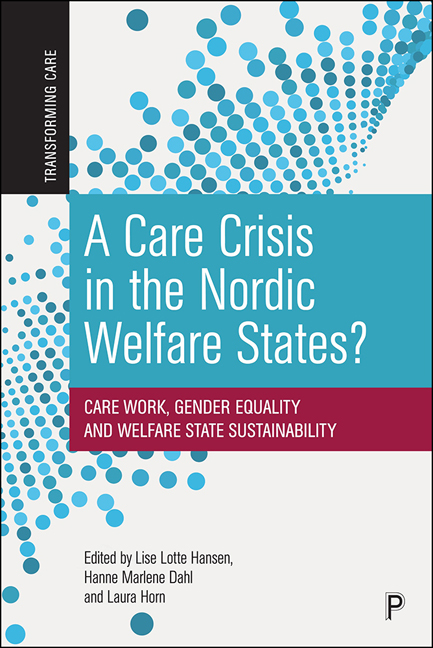 A Care Crisis in the Nordic Welfare States?
A Care Crisis in the Nordic Welfare States? Book contents
- Frontmatter
- Contents
- List of tables
- Notes on contributors
- Preface
- 1 Introduction: A care crisis in the Nordic welfare states?
- 2 The ‘care crisis’: its scientific framing and silences
- 3 Fraser’s care crisis theory meets the Nordic welfare societies
- 4 Crisis of care: a problem of economisation, of technologisation or of politics of care?
- 5 Deteriorating working conditions in elder care: an invisible crisis of care?
- 6 Managerialism as a failing response to the care crisis
- 7 ‘We are here for you’: the care crisis and the (un)learning of good nursing
- 8 Professionalisation of social pedagogues under managerial control: caring for children in a time of care crisis
- 9 Raising quality in Norwegian early childhood centres: (re)producing the care crisis?
- 10 Conclusion: Less caring and less gender-equal Nordic states
- 11 Postscript: A care crisis in the time of COVID-19
- Index
7 - ‘We are here for you’: the care crisis and the (un)learning of good nursing
Published online by Cambridge University Press: 13 May 2022
- Frontmatter
- Contents
- List of tables
- Notes on contributors
- Preface
- 1 Introduction: A care crisis in the Nordic welfare states?
- 2 The ‘care crisis’: its scientific framing and silences
- 3 Fraser’s care crisis theory meets the Nordic welfare societies
- 4 Crisis of care: a problem of economisation, of technologisation or of politics of care?
- 5 Deteriorating working conditions in elder care: an invisible crisis of care?
- 6 Managerialism as a failing response to the care crisis
- 7 ‘We are here for you’: the care crisis and the (un)learning of good nursing
- 8 Professionalisation of social pedagogues under managerial control: caring for children in a time of care crisis
- 9 Raising quality in Norwegian early childhood centres: (re)producing the care crisis?
- 10 Conclusion: Less caring and less gender-equal Nordic states
- 11 Postscript: A care crisis in the time of COVID-19
- Index
Summary
Introduction
Over the last few decades, nurses have had to do the necessary, and sometimes life-saving, care work at hospitals under genuinely changing political and organisational conditions. Following the regimes of New Public Management (NPM), new managerial discourses have been set up in Scandinavia, as well as in many other OECD countries, which have placed ever-increasing pressure on health-care workers (Malmmose, 2009; Centeno and Cohen, 2012). Managerial regimes have been implemented, partly to encourage efficiency through standardisation of care, but also to ensure commitment to the marketisation discourse and make ‘health care services’ more consumer-oriented and open, to meet the consumer's ‘right to choose’ between different service providers. The arrival of these new regimes and discourses have been followed by policy instructions to take up a more service-minded approach, displayed through the slogan, ‘We are here for you’, advertising the Regional Health Service on the website (Region Sjælland, 2016). This is part of a policy regime, aiming to address the needs of patients-as-customers and announcing the political and organisational concern, not only for consumer choices, but also for their safety – as a first priority. While it could in fact be seen as a commitment to address citizens’ and patients’ needs, we will discuss a different and more complex reality. The focus of this chapter is on the consequences of the current transformations of these governing regimes – here based on the recorded experiences of newly educated nurses from different medical wards in Region Zealand, Denmark.
The work of nurses has, since the beginning of the 21st century, been deeply influenced by international discourses of safety programmes; especially as outlined in the World Health Organisation's (WHO) conceptualisation of ‘patient safety friendly hospitals’ (WHO, 2016). These safety programmes are clearly linked to the discursive visions of NPM to improve health care services to secure consumer satisfaction, directly targeteding the issue of reliability of services. The organisational commitments have led to intensified monitoring of care practices, shifting the implied responsibilities towards the professionals rather than the patients (Mitchel, 2008), which has imposed further demands on health professionals to safeguard patients from the risk of malpractice in the name of patient-centredness.
- Type
- Chapter
- Information
- A Care Crisis in the Nordic Welfare States?Care Work, Gender Equality and Welfare State Sustainability, pp. 120 - 138Publisher: Bristol University PressPrint publication year: 2021


